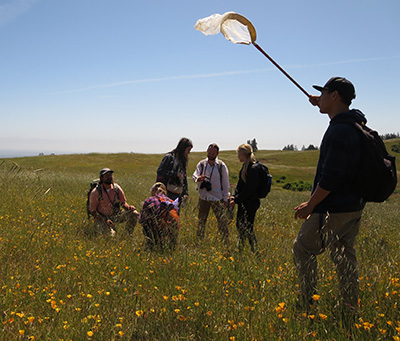Teams of naturalists and citizen scientists will fan out across the UC Santa Cruz campus and Younger Lagoon Reserve on Saturday, April 30, to explore and document the area's remarkable biodiversity in the first UCSC Bioblitz.
A bioblitz is a community event that brings together a wide variety of people to rapidly inventory the living organisms found in a particular place. The UCSC Bioblitz, organized by the UC Santa Cruz Natural Reserves, the Ken Norris Center for Natural History, and the California Academy of Sciences, will take place on Alumni Weekend, along with a concurrent bioblitz at Younger Lagoon Reserve on the UCSC Coastal Science Campus. Participants can register for one or both of these events on the Alumni Weekend registration site.
"It's an opportunity for students, alumni and their families, and community members to engage with faculty and staff experts, enjoy the outdoors, and explore the natural history of our incredible campus," said Alex Jones, manager of the UCSC Campus Natural Reserve.
The UCSC Bioblitz will have two shifts, morning and afternoon, and participants can join either or both. The morning shift (9 a.m. to 1 p.m.) will meet at the UCSC Arboretum at the Horticulture 2 building, and the afternoon shift (2 p.m. to 6 p.m.) will meet at the Ken Norris Center for Natural History in the Natural Sciences 2 building (room 239). The Younger Lagoon Bioblitz takes place from 9 a.m. to 1 p.m. and meets at Long Marine Laboratory.
Expertise in natural history is not required to participate, Jones said. The bioblitz will use a citizen science platform called iNaturalist, supported by the California Academy of Sciences, that includes a free app for smart phones and tablets. Teams will work together to find and identify as many different species as possible in UCSC's wide variety of natural habitats. After taking photographs and geographically pinpointing their findings, the teams will come back together at the end of each shift to upload their records, share stories, and help each other with identifications.
"The California Academy of Sciences has an active citizen science program, and they do a lot of these events. They'll have staff members here to help and guide us through the process," Jones said.
The bioblitz will give UCSC Natural Reserves staff a better sense of the distribution of species on campus, he said. The results will also provide data that could be useful for researchers. The iNaturalist platform shares findings with scientific data repositories like the Global Biodiversity Information Facility to help scientists find and use the data.
Details and registration information are available on the UCSC Bioblitz web site.



